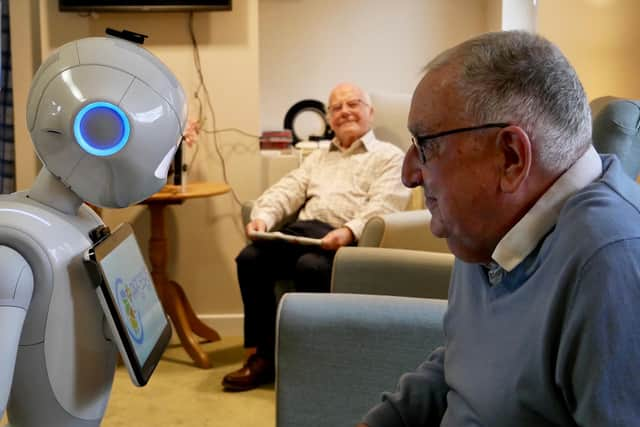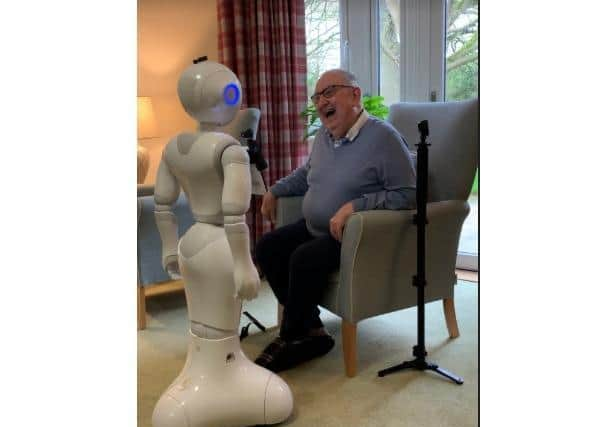University of Bedfordshire involved in study that shows robots could improve mental health and loneliness in older people
and live on Freeview channel 276
A study has shown that robots can improve mental health and have the potential to reduce loneliness in older people.
The evaluation of CARESSES, the largest ever global study, involving the University of Bedfordshire, Middlesex University and Advinia Health Care, is the first time researchers have collaborated to explore the possibility of developing culturally competent robots.
Advertisement
Hide AdAdvertisement
Hide AdRobots were tested in care homes in the UK and researchers found that older adults who used the culturally competent robot called Pepper – up to 18 hours across two weeks – saw a significant improvement in their mental health.


While the evaluation results reveal the limitations of the project, they also demonstrate that culturally competent robots can improve mental health and have potential to reduce loneliness in older people.
The study was coordinated by University of Genova in Italy which developed the robot’s Artificial Intelligence.
CARESSES was jointly funded by the EU and the Japanese Government within the H2020 research and innovation programme. Global researchers* have participated in the project in collaboration with the world leading Robotics Company SoftBank Robotics.
Key results from the evaluation reveal:


Advertisement
Hide AdAdvertisement
Hide Ad- Older adults in care homes who used the culturally competent robot (up to 18 hours across two weeks) saw a significant improvement in their mental health
- After two weeks of using the system there was a small but positive impact on loneliness severity among users. The system did not increase feelings of loneliness
- The system had a significant positive impact on participants’ attitudes towards robots.
Lead author of the evaluation, Dr Chris Papadopoulos from the University of Bedfordshire said: “This study is ground-breaking because it is the largest ever investigation into the use of autonomous social robots for older adults in care settings.
Advertisement
Hide AdAdvertisement
Hide Ad"The results show that using the CARESSES artificial intelligence in robots such as Pepper has real potential benefit to a world that is witnessing more people living longer with fewer people to look after them.
"Poor mental health and loneliness are significant health concerns and we have demonstrated that robots can help alleviate these.”
The CARESSES study is the first time researchers have collaborated to explore the possibility of developing culturally competent robots.
Irena Papadopoulos, Professor of Transcultural Health and Nursing at Middlesex University was responsible for developing the cultural concepts and guidelines so that the robots were able to respond to the culture-specific needs and preferences of older people.
Advertisement
Hide AdAdvertisement
Hide AdShe said: “In the UK alone, 15,000 people are over 100 years of age and this figure will only increase.
"Socially assistive, intelligent robots for older people could relieve some pressures in hospitals and care homes.
"No-one is talking about replacing humans – the evaluation demonstrates that we are a long way from doing that – but it also reveals that robots could support existing care systems.
“While results demonstrate that our experimental robot was more culturally competent to users, they also reveal that there is room for improvement.
Advertisement
Hide AdAdvertisement
Hide Ad"Participants were mostly positive but also criticised some of the interactions which are probably due to speech recognition limitations. Further research will build on this pioneering project in the future.”
Professor Antonio Sgorbissa from the University of Genova, leader on Artificial Intelligence development, said: “Our trial was one of the most rigorous, complex and largest of its kind to date and limitations need to be viewed against this backdrop.
"The Artificial Intelligence developed in the project allowed the robot to autonomously interact with older people for many hours, even if we had issues with time pressure and technical problems.
“However, despite these we have demonstrated that culturally competent robots can relieve loneliness and improve mental health in older people.
"It is essential to continue this research to maximise the potential of Artificial Intelligence and use it for social good.”